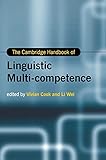The Cambridge handbook of linguistic multi-competence / edited by Vivian Cook and Li Wei.
Material type: TextLanguage: English Series: Cambridge Handbooks in Language and LinguisticsPublisher: Cambridge ; New York: Cambridge University Press, 2016©2016 Edition: First edition: 2016Description: 574 pages : illustrations ; 25 cmContent type: text Media type: unmediated Carrier type: volumeISBN: 9781107059214 (hardback)Other title: Handbook of linguistic multi-competenceSubject(s): Multilingualism -- Handbooks, manuals, etc | Communicative competence -- Handbooks, manuals, etc | Second language acquisition -- Handbooks, manuals, etc | Language awareness -- Handbooks, manuals, etcLOC classification: P115.4 .C36 2016
TextLanguage: English Series: Cambridge Handbooks in Language and LinguisticsPublisher: Cambridge ; New York: Cambridge University Press, 2016©2016 Edition: First edition: 2016Description: 574 pages : illustrations ; 25 cmContent type: text Media type: unmediated Carrier type: volumeISBN: 9781107059214 (hardback)Other title: Handbook of linguistic multi-competenceSubject(s): Multilingualism -- Handbooks, manuals, etc | Communicative competence -- Handbooks, manuals, etc | Second language acquisition -- Handbooks, manuals, etc | Language awareness -- Handbooks, manuals, etcLOC classification: P115.4 .C36 2016| Item type | Current library | Shelving location | Call number | Copy number | Status | Date due | Barcode |
|---|---|---|---|---|---|---|---|
| Books | MEF Üniversitesi Kütüphanesi | Genel Koleksiyon | P 115.4 .C36 2016 (Browse shelf (Opens below)) | Available | 0008888 |
Browsing MEF Üniversitesi Kütüphanesi shelves, Shelving location: Genel Koleksiyon Close shelf browser (Hides shelf browser)

|

|

|

|

|

|

|
||
| P 107 .P5319 2016 Dilin en güzel tarihi / | P 107 .P5619 2018 Düşüncenin maddesi : insan doğasına açılan pencere olarak dil / | P 115 .B53 2008 The Blackwell guide to research methods in bilingualism and multilingualism / | P 115.4 .C36 2016 The Cambridge handbook of linguistic multi-competence / | P 116 .T6619 2017 İnsan iletişiminin kökenleri / | P 118 .H64 2014 Language development / | P 118.15 .P79 2012 Psychology for language learning : insights from research, theory and practice / |
"How are two or more languages learned and contained in the same mind or the same community? This handbook presents an up-to-date view of the concept of multi-competence, exploring the research questions it has generated and the methods that have been used to investigate it. The book brings together psychologists, sociolinguists, Second Language Acquisition (SLA) researchers, and language teachers from across the world to look at how multi-competence relates to their own areas of study. This comprehensive, state-of-the-art exploration of multi-competence research and ideas offers a powerful critique of the values and methods of classical SLA research, and an exciting preview of the future implications of multi-competence for research and thinking about language. It is an essential reference for all those concerned with language learning, language use and language teaching"-- Provided by publisher.
"How are two or more languages learned and contained in the same mind or the same community? This handbook presents an up-to-date view of the concept of multi- competence, exploring the research questions it has generated and the methods that have been used to investigate it. The book brings together psychologists, sociolinguists, Second Language Acquisition (SLA) researchers, and language teachers from across the world to look at how multi-competence relates to their own areas of study"-- Provided by publisher.
Machine generated contents note: 1. Premises of multi-competence Vivian Cook; 2. Research questions and methodology of multi-competence Goro Murahata, Yoshiko Murahata and Vivian Cook; 3. Multi-competence in Second Language Acquisition: inroads into the mainstream? Lourdes Ortega; 4. Not through a glass darkly: refocusing the psycholinguistic study of bilingualism through a 'bivocal' lens Jyotsna Vaid and Renata Meuter; 5. Multilingualism research Rita Francheschini; 6. Multi-competence and dynamic/complex systems Kees de Bot; 7. Multi-competence and dominant language constellation Larissa Aronin; 8. Consequences of multi-competence for sociolinguistics research Li Wei; 9. A usage-based account of multi-competence Joan Kelly Hall; 10. Multi-competence and syntax Éva Berkes and Suzanne Flynn; 11. Syntactic processing Leah Roberts; 12. Language and cognition in bilinguals Annette M. B. de Groot; 13. Gestures in multi-competence Amanda Brown; 14. Pragmatic transfer in foreign language learners: a multi-competence perspective I-Ru Su; 15. Multi-competence and endangered language revitalization Tracy Hirata-Edds and Lizette Peter; 16. Multi-competence and first language attrition Bregtje Seton and Monika S. Schmid; 17. Cognitive consequences of multi-competence Panos Athanasopoulos; 18. Space, motion and thinking for language Anna Ewert; 19. Multi-competence and personality Jean-Marc Dewaele; 20. Multi-competence as a creative act: ramifications of the multi-competence paradigm for creativity research and creativity fostering education Anatoliy V. Kharkhurin; 21. Multi-competence and language teaching Virginia M. Scott; 22. Multi-competence and emotion Jean-Marc Dewaele; 23. Multi-competence and English as a lingua franca Ian MacKenzie; 24. A critical reaction from second language acquisition research David Singleton; 25. Questions of multi-competence: a written interview on issues raised in this book Guillaume Thierry; 26. Epilogue: multi-competence and the translanguaging instinct Li Wei.
